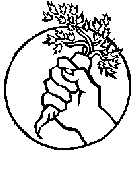
| Contents | Start | Previous | Next |

The first arrest at Golden Gate Park. August 15,1988.
Photograph by Greg Gaar.
Case in point: on July 11, 1988, after serving food forseveral months without city interference, the San Francisco Food Not Bombs group wrote a simple, one-page permit request to the Recreation and Parks Department at the suggestion of some community organizers. This unfortunately alerted the government to the meal distribution program, and gave it an opportunity to deny us a permit. It then used this as an excuse to harass the food table and arrest volunteers.
Although the government may create reasons for denying you a permit,
you should not be intimidated. Make clear that you are willing to adopt
any proposal that will make your operation safer and more successful, but
also that you will not agree to any demand making it impossible
for you to continue your operation. Even after long hours of meeting with
government officials, hard-earned permits can be revoked at any moment.
From the government's point of view, a permit is something it can
take away whenever it wants. (Remember the Indian treaties?) Because
of this, we strongly recommend that you not contact the local government.
The revolution needs no permit.
Nonviolence Training
In most places, the authorities recognize that sharing free food and information is an unregulated activity protected by the First Amendment. However, this is not true everywhere. If your group feels it might risk arrest by serving food in public, it would be a good idea to contact a knowledgeable activist or supportive lawyer in your area and spend a day preparing yourselves by role-playing, discussing how you might respond to various situations, and considering the legal consequences of your actions.
In fact, if you think you might be facing arrest, it is very helpful to arrange a nonviolence training beforehand. In most areas, local peace groups will be able to direct you to people who can lead trainings. Also, the War Resisters League in New York City has a national directory of trainers and a handbook for trainings. Ifyou cannot find an experienced trainer, gather the group together for a day and conduct your own training. Talk about what might happen and some of the ways the event could lead to violence. Discuss how to respond nonviolently. Then do some role-playing and act out some of the possible scenarios, some people playing the police and others the activists. This is both very educational and helpful for you to overcome your fear of arrest. Legal consequences, jail solidarity, and legal defense for trial (if any) can also be discussed at the training.
If the Government Arrests You -- Noncooperation
Whether or not you think you actually will be arrested, willingness
to suffer arrest can be very empowering. Your lack of fear of arrest actually
makes it less likely. If you do get arrested for serving free food
to the homeless, noncooperation with the police is politically empowering
and personally satisfying The most basic form of noncooperation is refusal
to give your name or address. This makes the attempt to dominate you more
difficult. If you refuse to identify yourself, the police will often try
to intimidate you by holding you in solitary confinement, refusing you
access to a lawyer, denying you transportation to court, and engaging in
similar threats and oppressive tactics. Politely but firmly tell them you
will not give your name; most of the time, the police will give up after
one or two attempts to scare you. They will book you as Jane or John Doe,
and take your picture and possibly your fingerprints.
| Contents | Start | Previous | Next |